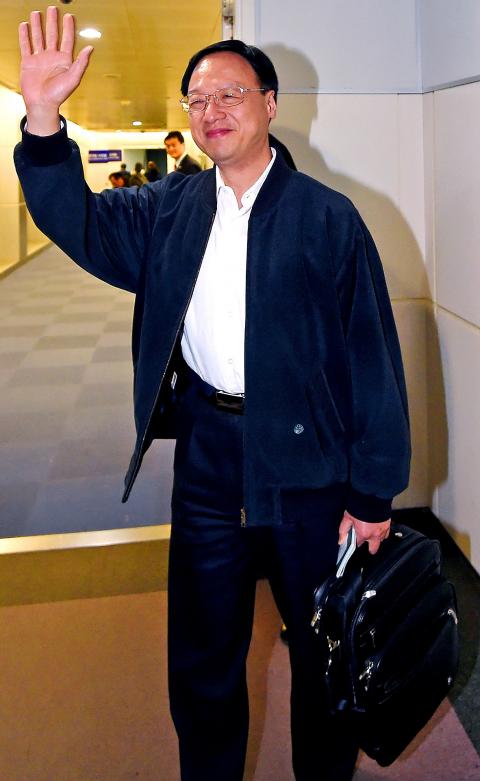Former premier Jiang Yi-huah (江宜樺), who resigned following the Chinese Nationalist Party’s (KMT) landslide defeat in last year’s nine-in-one elections, yesterday left for the US to serve a year as a visiting academic at Harvard and Stanford universities.
Jiang left a day after being named as one of the Presidential Office’s senior advisers.
The Presidential Office announced a new list of senior advisers and national policy advisers, who are to remain in their positions until May 19 next year.

Photo: Chu Pei-de, Taipei Times
It is likely to be the last adviser appointment before President Ma Ying-jeou’s (馬英九) second term ends.
The list includes former Presidential Office secretary-general Timothy Yang (楊進添) and former Examination Yuan president John Kuan (關中) as senior advisers — the other 24 positions were chosen by reappointment.
Jiang was a political science professor at National Taiwan University before he joined the Ma administration in 2000, taking the positions of minister of the research, development and evaluation commission, minister of the interior, vice premier and premier.
Jiang earned his doctorate at Yale University, specializing in political philosophy and Hannah Arendt’s political theory.
He cited Arendt twice in a speech given before leaving the Cabinet, referring to her idea of the public sphere and her words saying that a life spent entirely in the public realm would become shallow.
The former premier left the Cabinet amid controversies, including his decision to forcefully evict Sunflower movement protesters from the front square of the Executive Yuan on March 24 last year, a move that reportedly left scores of protesters injured.
Academia Sinica researcher Huang Kuo-chang (黃國昌), one of the leading protesters in the Sunflower movement, condemned the appointment.
“Though being Ma’s adviser is not something that could be seen as an honor, the nation’s official titles, however, should not be used as personal favors,” Huang said on Facebook on Friday after the announcement.
“Jiang, who caused so many injuries and has not yet offered any apology or been held accountable, is in no position [to receive the title],” he said.

‘DENIAL DEFENSE’: The US would increase its military presence with uncrewed ships, and submarines, while boosting defense in the Indo-Pacific, a Pete Hegseth memo said The US is reorienting its military strategy to focus primarily on deterring a potential Chinese invasion of Taiwan, a memo signed by US Secretary of Defense Pete Hegseth showed. The memo also called on Taiwan to increase its defense spending. The document, known as the “Interim National Defense Strategic Guidance,” was distributed this month and detailed the national defense plans of US President Donald Trump’s administration, an article in the Washington Post said on Saturday. It outlines how the US can prepare for a potential war with China and defend itself from threats in the “near abroad,” including Greenland and the Panama

A wild live dugong was found in Taiwan for the first time in 88 years, after it was accidentally caught by a fisher’s net on Tuesday in Yilan County’s Fenniaolin (粉鳥林). This is the first sighting of the species in Taiwan since 1937, having already been considered “extinct” in the country and considered as “vulnerable” by the International Union for Conservation of Nature. A fisher surnamed Chen (陳) went to Fenniaolin to collect the fish in his netting, but instead caught a 3m long, 500kg dugong. The fisher released the animal back into the wild, not realizing it was an endangered species at

The High Prosecutors’ Office yesterday withdrew an appeal against the acquittal of a former bank manager 22 years after his death, marking Taiwan’s first instance of prosecutors rendering posthumous justice to a wrongfully convicted defendant. Chu Ching-en (諸慶恩) — formerly a manager at the Taipei branch of BNP Paribas — was in 1999 accused by Weng Mao-chung (翁茂鍾), then-president of Chia Her Industrial Co, of forging a request for a fixed deposit of US$10 million by I-Hwa Industrial Co, a subsidiary of Chia Her, which was used as collateral. Chu was ruled not guilty in the first trial, but was found guilty

DEADLOCK: As the commission is unable to forum a quorum to review license renewal applications, the channel operators are not at fault and can air past their license date The National Communications Commission (NCC) yesterday said that the Public Television Service (PTS) and 36 other television and radio broadcasters could continue airing, despite the commission’s inability to meet a quorum to review their license renewal applications. The licenses of PTS and the other channels are set to expire between this month and June. The National Communications Commission Organization Act (國家通訊傳播委員會組織法) stipulates that the commission must meet the mandated quorum of four to hold a valid meeting. The seven-member commission currently has only three commissioners. “We have informed the channel operators of the progress we have made in reviewing their license renewal applications, and